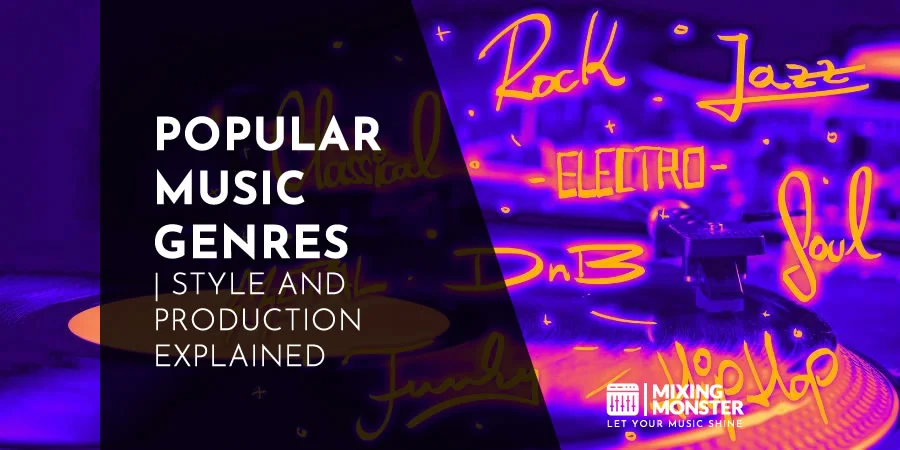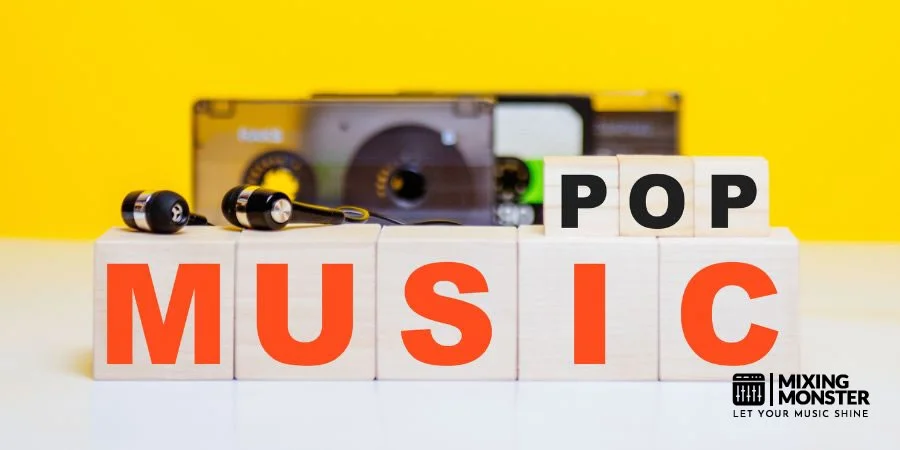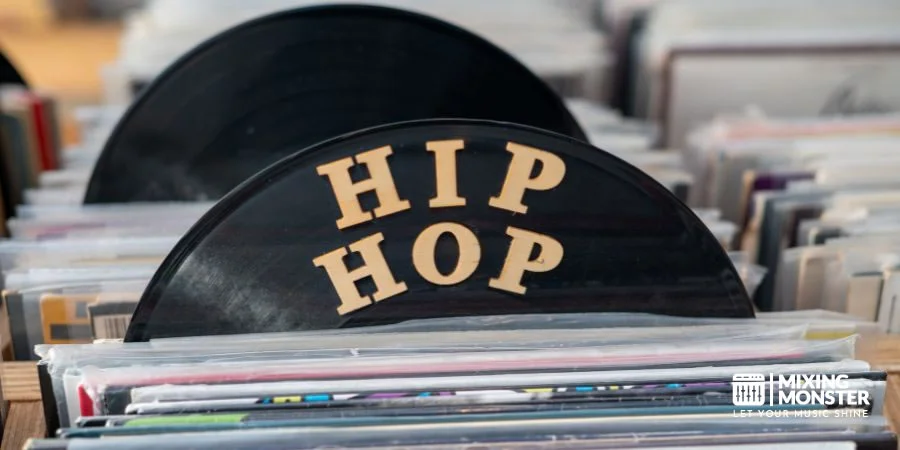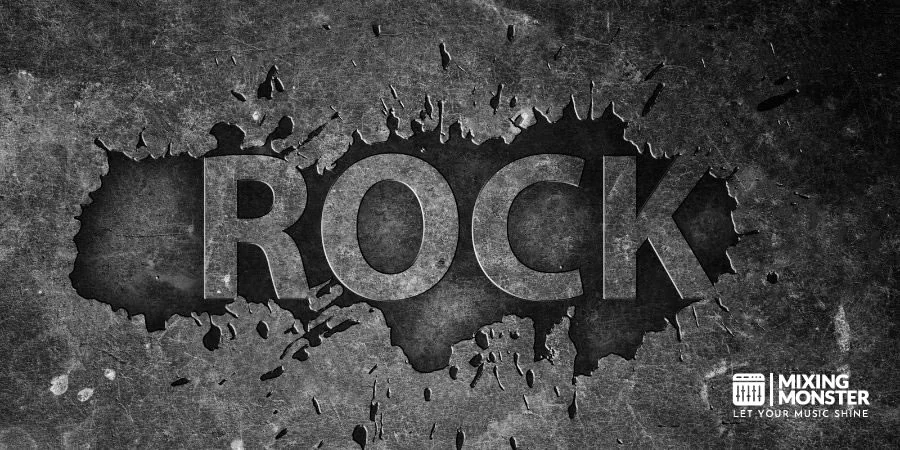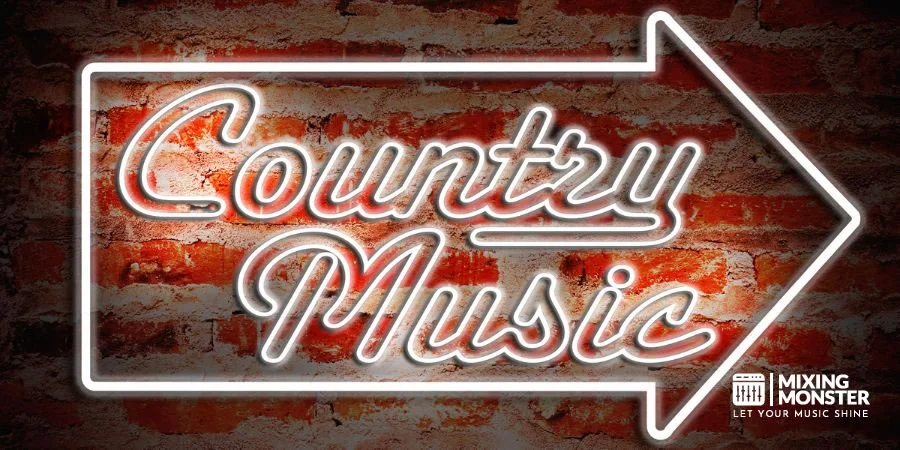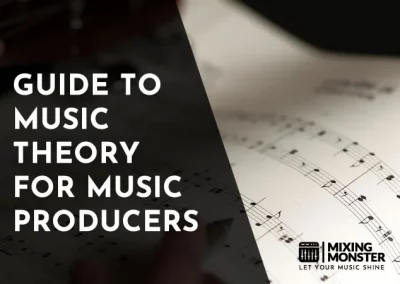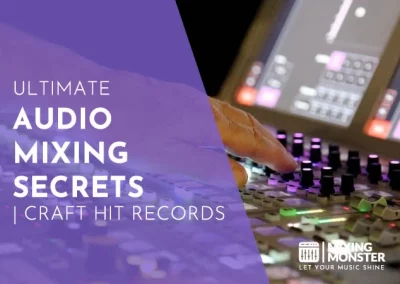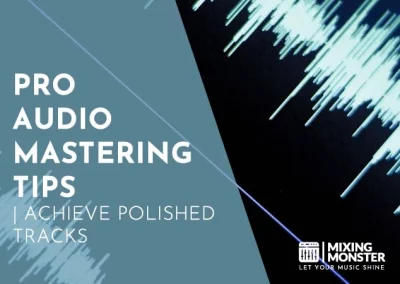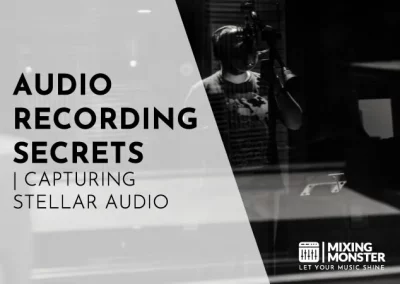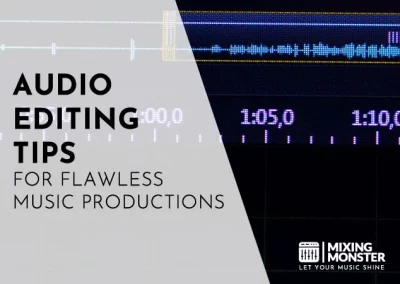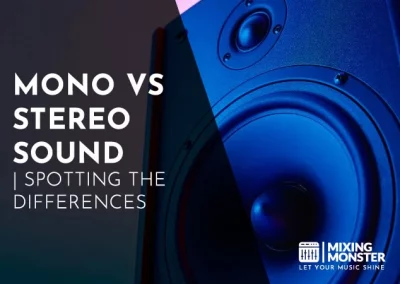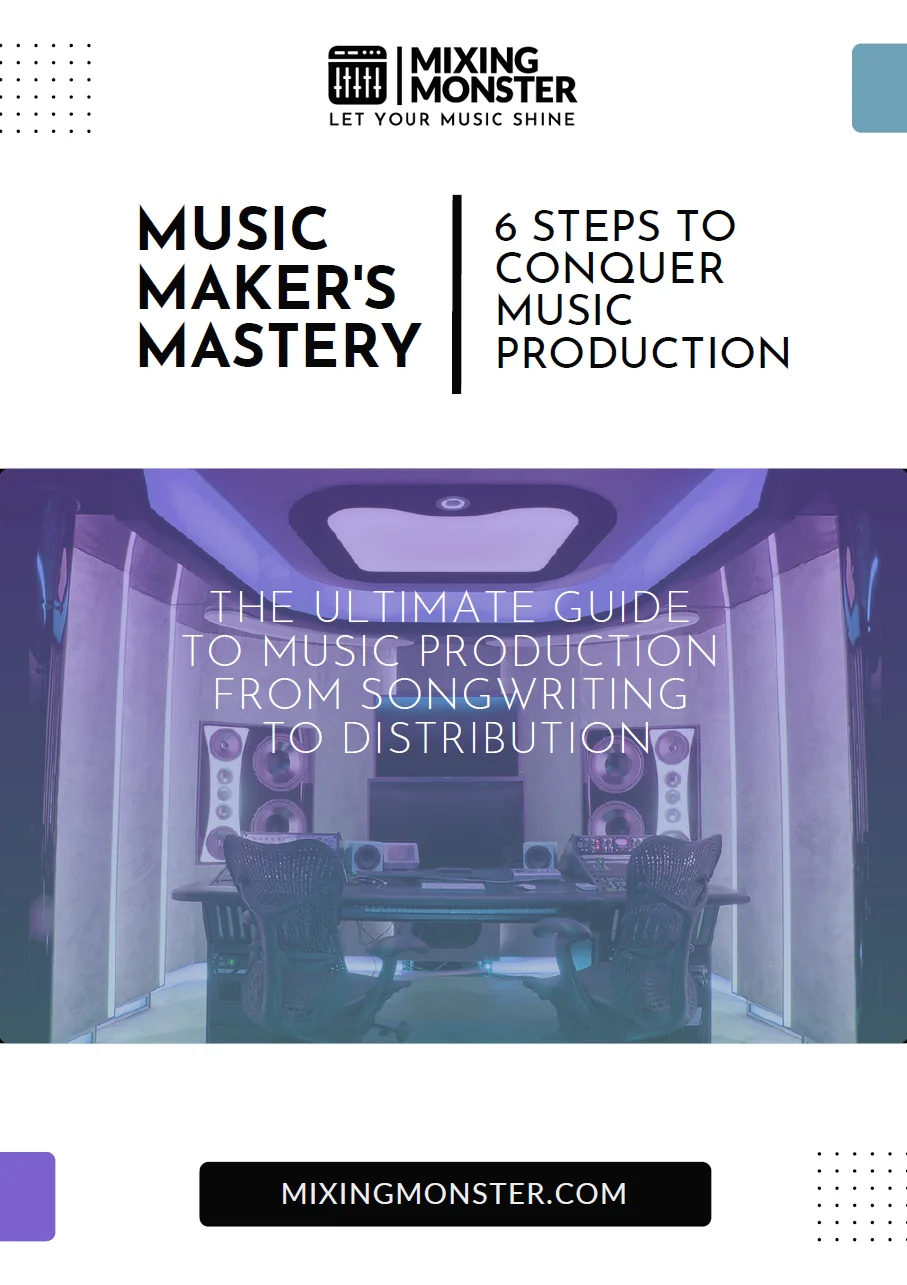Home > Blog > Music > Music Theory
Affiliate Disclaimer: We may earn a commission if you purchase through our links
Popular music genres contain diverse styles and intricate production techniques. This article uncovers the unique characteristics that define each genre, revealing the artistry and technical skills behind today’s most beloved musical styles in music production. Whether you’re a seasoned audiophile or a curious newcomer, this guide promises an enlightening experience in modern music.
Popular music genres encompass various styles, each defined by unique elements such as rhythm, melody, and music production methods. Music genres reflect a rich tapestry of cultural and artistic expressions, enhancing our appreciation of music. The diverse landscape of music genres is evolving rapidly, offering new and creative musical experiences.
As we explore popular music genres, we’ll dive deeper into what makes each style unique, the challenges artists face in music production, and the groundbreaking work of influential musicians. This guide can’t cover all existing music genres, but it will still provide invaluable insights for enthusiasts and aspiring creators, enriching our understanding and appreciation of contemporary music!
Table Of Contents
1. The Landscape Of Music Genres
2. Pop Music: The Heartbeat Of Mainstream Melodies
3. Deciphering The Beats: A Look At Hip-Hop And Rap
4. The Soulful World Of R&B: Rhythm And Blues
5. Electronic Music: Synthesizing Beats And Cultures
6. Rock Music: The Ever-Evolving Power Genre
7. Country Music: Storytelling Through Melody
8. Emerging Genres: The Future Of Music
9. Navigating The Music Production Landscape
10. Summing Up Popular Music Genres
11. FAQ

1. The Landscape Of Music Genres
The Current Scene In Popular Music
Popular music genres continue to enchant and evolve, offering various styles that resonate with diverse audiences. These genres, each with its unique identity and fan base, form a vibrant mosaic that reflects the dynamic nature of today’s music scene.
From the infectious rhythms of pop to the soul-stirring beats of R&B, each genre contributes to the ever-changing tapestry of the musical landscape.
Music Genre Diversity: More Than Just A Sound
The diversity in music genres is not just a matter of sound; it embodies cultural influences, artistic creativity, and technological advancements.
Genres like hip-hop, rock, and electronic music are not just categories of tunes but are rich narratives that tell stories of societal changes, technological innovations, and evolving tastes.
This diversity makes the music scene so intriguing and evergreen compared to other art forms, offering something for every listener.
The Role Of Technology In Shaping Music
Technology plays a pivotal role in shaping the sound and soul of music genres. Technological advancements have expanded the horizons of what’s possible in music production, from the traditional strings of a country guitar to the synthesized beats of electronic music.
Today’s music combines art and technology, where digital tools and traditional instruments coalesce to create once-unimaginable sounds. Do you feel the need to combine a medieval flute with a synthesizer? Nowadays, your imagination is the only limit in shaping music!
2. Pop Music: The Heartbeat Of Mainstream Melodies
Let’s dive into the first and maybe most beloved contemporary music genre: pop music!
Defining Characteristics Of Pop Music
Pop music, the epitome of mainstream melodies, is characterized by its catchy rhythms and relatable lyrics. It’s a genre that resonates with a broad audience thanks to its blend of simplicity and infectious charm.
The structure of pop songs, often featuring memorable choruses and hooks, makes them easily recognizable and widely appealing.
Click on the image below to listen to how we mixed and mastered a pop music sample:
The Craft Of Producing Chart-Topping Pop Hits
Producing a pop hit requires more than just a catchy tune; it involves a meticulous songwriting, sound engineering, and marketing process.
Producers and artists collaborate to create a sound that resonates with current trends and retains a timeless quality. The production process is a delicate balance of creativity and strategy, aiming to strike a chord with listeners worldwide.
Iconic Pop Artists And Their Influence
Pop music has been shaped by numerous iconic artists whose work has left an indelible mark on the genre.
From the dance-pop rhythms of Madonna to the innovative sounds of Michael Jackson, these artists have not only defined what pop music sounds like but have also influenced cultural trends. Their contributions extend beyond music, impacting fashion, media, and societal norms.
Want to learn more about how to effectively mix pop music? Here you go:
3. Deciphering The Beats: A Look At Hip-Hop And Rap
The Essence Of Beat And Flow
Hip-hop and rap are genres deeply rooted in rhythm and poetry. The essence of these genres lies in the unique combination of intricate beats and lyrical flow.
The rhythm is the backbone, while the lyrics deliver potent messages, storytelling, and commentary on societal issues. This genre is a platform for expression, providing a voice to diverse perspectives.
Click on the image below to listen to how we mixed and mastered a hip-hop music sample:
Production Techniques In Hip-Hop And Rap
Producing hip-hop and rap involves an artful blend of sampling, beat-making, and lyricism.
Producers use various techniques to create complex rhythms and soundscapes that complement the vocal flow. Using samples from older tracks is a hallmark of the genre, adding a layer of nostalgia and depth to the music.
Key Artists Shaping The Hip-Hop And Rap Genre
Artists like Tupac Shakur, Notorious B.I.G., and more recently, Kendrick Lamar and J. Cole have significantly influenced the hip-hop and rap scenes.
Their work has pushed the boundaries of the genre, introducing innovative sounds and poignant narratives. These artists have become cultural icons, influencing music, fashion, language, and social movements.
4. The Soulful World Of R&B: Rhythm And Blues
The Core Elements Of R&B
R&B, or Rhythm and Blues, combines soulful melodies with smooth rhythms, often conveying deep emotions and personal stories.
The genre’s core elements include a strong focus on vocal prowess, expressive lyrics, and a blend of electronic and acoustic sounds. R&B uniquely connects with listeners emotionally, making it a profoundly personal and beloved genre.
Click on the image below to listen to how we mixed and mastered a R&B music sample:
Challenges In Producing Soulful Melodies
Producing R&B music involves navigating the complexities of creating soul-stirring melodies that resonate with listeners.
One of the main challenges is balancing musicality with commercial appeal, ensuring that the genre’s soul is preserved in pursuit of mainstream success. Producers and artists must work closely to maintain the authenticity and emotional depth of the music.
R&B Icons And Their Impact On The Genre
R&B has been shaped by numerous icons such as Aretha Franklin, Marvin Gaye, and, more recently, artists like Beyoncé and Usher.
These artists have defined the sound of R&B and played a significant role in its evolution. Their contributions have ensured that R&B remains a vibrant and evolving genre, continuously adapting to new trends and influences.

5. Electronic Music: Synthesizing Beats And Cultures
Exploring The Range Of Electronic Subgenres
Electronic music is a broad and diverse genre, encompassing a wide range of subgenres from ambient to techno, house to dubstep. Each subgenre offers a unique sound and atmosphere, often driven by synthesizers and digital production.
This diversity allows electronic music to appeal to a broad audience, each finding their niche in the rhythmic complexities and layered textures.
Click on the image below to listen to how we mixed and mastered an electronic music sample:
The Complexity Behind Electronic Music Production
Electronic music production is intricate, blending sound synthesis, audio manipulation, and beat sequencing. Producers in this genre are often innovators, experimenting with new sound technologies and production techniques.
The complexity lies in creating a cohesive and engaging musical experience transcending traditional acoustic boundaries.
Pioneers And Trendsetters In Electronic Music
Electronic music owes its evolution to pioneers like Kraftwerk and Jean-Michel Jarre and more contemporary artists like Daft Punk and Deadmau5.
These artists and producers have pushed the boundaries of sound, introducing new electronic elements that have redefined music production. Their influence extends beyond electronic music, impacting other genres and the music industry.
6. Rock Music: The Ever-Evolving Power Genre
Understanding The Subgenres Of Rock
Rock music, known for its powerful sound and rebellious spirit, encompasses a variety of subgenres, including classic rock, punk, metal, and indie rock.
Each subgenre has its distinct characteristics, from the guitar-driven anthems of classic rock to the raw energy of punk. This diversity allows rock music to reinvent itself, staying relevant across generations continually.
Click on the image below to listen to how we mixed and mastered a rock music sample:
The Art Of Producing Rock Music
Producing rock music is a balance of capturing raw energy and fine-tuning musical elements. It involves understanding instrumentation, particularly the central role of electric guitars, drums, and bass.
The challenge lies in preserving rock’s energetic feel while ensuring high-quality sound production.
Legendary Rock Artists And Bands
Rock music has been shaped by legendary bands like The Beatles, Led Zeppelin, The Rolling Stones, and artists like Jimi Hendrix. Their groundbreaking work has not only defined the sound of rock music but has also influenced the broader cultural landscape.
These artists left a legacy of innovation and inspiration that continues to influence new generations of musicians.
7. Country Music: Storytelling Through Melody
The Roots And Subgenres Of Country
Country music, rooted in folk and blues, tells stories of life, love, and experience. It has evolved to include a range of subgenres, from classic country to bluegrass and contemporary country-pop.
Each subgenre maintains the storytelling aspect, a hallmark of country music, while bringing its musical style.
Click on the image below to listen to how we mixed and mastered a country music sample:
Producing Authentic Country Music
Producing country music involves capturing its storytelling essence and blending traditional acoustic sounds with modern musical elements.
The challenge for producers is maintaining the genre’s authenticity while adapting to contemporary musical tastes. This requires a deep understanding of country music’s history and core elements.
Influential Voices In Contemporary Country
Contemporary country music has been influenced by artists like Johnny Cash and Dolly Parton and more recent stars like Taylor Swift and Carrie Underwood.
These artists have contributed to the genre’s evolution, blending traditional country sounds with pop, rock, and electronic elements. Their work has expanded the reach of country music, attracting new audiences while respecting its roots.
8. Emerging Genres: The Future Of Music
Identifying Up-And-Coming Music Genres
The music industry continually evolves, with new genres emerging as artists experiment with sound and music production.
These emerging genres often reflect current cultural and technological trends, blending established styles with innovative approaches. Identifying these genres requires a keen ear and an understanding of the ever-changing musical landscape.
The Process Of Developing New Music Styles
Developing new music styles involves a combination of creativity, experimentation, and an understanding of current trends.
Artists and producers who venture into new genres often draw on diverse musical influences, pushing the boundaries of conventional sound. This process is dynamic and ever-evolving, contributing to the rich tapestry of music.
Artists Leading The Charge In Music Innovation
Music innovation is driven by artists unafraid to experiment and challenge the status quo. These artists, often independent or emerging talents, bring fresh perspectives and new sounds to the music scene.
Their contributions paved the way for the future of music, influencing both their contemporaries and future generations of musicians.
9. Navigating The Music Production Landscape
Understanding Music Production Across Genres
Music production varies significantly across genres, requiring a unique approach to sound recording, mixing, and mastering.
Understanding these nuances is crucial for producers, as it allows them to enhance the distinct qualities of each genre. This knowledge is critical to producing music that is both authentic and innovative.
Essential Characteristics Of Popular Music Genres
| Genre | Key Elements | Notable Artists |
| Pop | Catchy melodies, mainstream appeal | Madonna, Michael Jackson |
| Hip-Hop/Rap | Rhythmic beats, lyrical flow | Tupac Shakur, Kendrick Lamar |
| R&B | Soulful melodies, emotional depth | Beyoncé, Marvin Gaye |
| Electronic | Synthesized sounds, diverse subgenres | Daft Punk, Deadmau5 |
| Rock | Electric guitar, energetic performances | The Beatles, Led Zeppelin |
| Country | Storytelling lyrics, acoustic sound | Johnny Cash, Taylor Swift |
| Emerging Genres | Innovation, blending styles | Various new artists |
The Role Of Producers In Shaping Music
Producers play a vital role in shaping the sound and direction of music. They collaborate closely with artists, bringing technical expertise and creative insight to music production.
Producers often bridge an artist’s vision and the final musical product, influencing a track’s overall sound and feel.
Top 5 Challenges In Music Production:
- Maintaining Genre Authenticity:
Balancing originality with genre conventions. - Technological Advancements:
Keeping up with rapidly evolving production tools. - Artistic Collaboration:
Harmonizing the vision of artists and producers. - Audience Engagement:
Ensuring the music resonates with listeners. - Innovative Sound Creation:
Continuously experimenting to create unique sounds.
Music Production Technologies Overview
The landscape of music production technologies is vast and constantly evolving. These technologies provide producers with various tools to create and manipulate sound, from traditional analog equipment to cutting-edge digital software.
Staying abreast of these advancements is essential for producers looking to push the boundaries of music production.
10. Summing Up Popular Music Genres
Music Genre Exploration: Endless Possibilities
Exploring popular music genres is an endless journey, with each genre offering unique insights and experiences.
From the heartfelt stories of country music to the electronic landscapes of EDM, each genre provides a window into different cultures, emotions, and artistic expressions.
This diversity makes music a universal language, continually evolving and resonating with people across the globe.
The Continuous Change In Music Styles
Music styles are constantly in flux, influenced by cultural shifts, technological advancements, and artistic experimentation.
This continuous change keeps the music industry dynamic and exciting, offering endless possibilities for creators and listeners. As we look to the future, we can expect music to continue evolving, reflecting the changing world around us.
What Lies Ahead For Music Enthusiasts
For music enthusiasts, the future holds a wealth of new sounds, genres, and experiences.
Technological advancements will continue revolutionizing music production, allowing for even more creative expression and innovation.
As we embrace these changes, music will remain vital to our cultural landscape, connecting people across time and space!
Let your music shine!
11. FAQ
- What Defines A Music Genre?
Musical characteristics, cultural influences, and artistic conventions define a music genre. Genres provide a way to categorize music based on similarities in sound, instrumentation, rhythm, and thematic content. However, the boundaries of genres are often fluid, with many artists blending elements from multiple genres. - How Has Music Production Evolved In Recent Years?
Music production has evolved significantly in recent years with digital technology and software advancements. These developments have made music production more accessible and have opened up new possibilities for sound creation and manipulation. The evolution of music production has also led to the emergence of new genres and styles. - Who Are Some Of The Most Influential Artists In Various Music Genres?
Each music genre has influential artists who have shaped its sound and direction. For example, in rock, artists like The Beatles and Led Zeppelin; in pop, Madonna and Michael Jackson; in hip-hop, Tupac and Kendrick Lamar; in electronic music, Kraftwerk and Daft Punk; and in country, Johnny Cash and Dolly Parton. - What Challenges Do Producers Face In Different Music Genres?
Producers face various challenges in different music genres, including maintaining the genre’s authenticity, adapting to changing trends, and balancing creativity with commercial viability. They must also navigate the technical aspects of music production, such as sound engineering and mixing. - How Do New Music Genres Emerge And Gain Popularity?
New music genres often emerge from blending existing styles, cultural influences, and innovative production techniques. They gain popularity through exposure on various media platforms, the impact of key artists, and resonance with contemporary cultural and societal trends.

